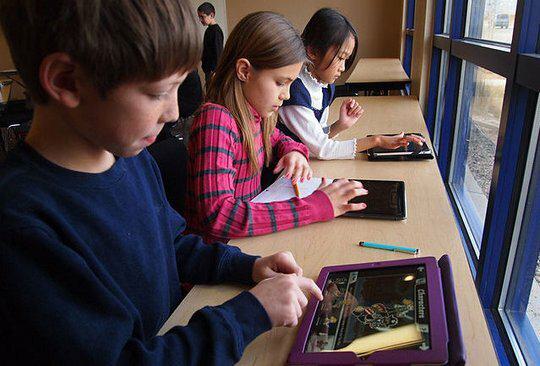How the iPad Fad is Dumbing Down American School Children

The Los Angeles School District spent $1.3 billion dollars to put an iPad in the hand of every student, teacher and administrator. That was back in 2013. But now, less than two years later, the expensive iPad experience has proved to be a complete failure. The school district even tried to return the iPads to Apple Inc. for a refund, citing technical problems with the Pearson educational program and an incomplete curriculum, making it impossible for teachers to properly teach.
This debacle illustrates a deeper problem affecting schools across the country -- call it tech-mania. The fascination for new technology -- without thinking about the reasons, problems, and effects of its use -- is not turning out well. But advocates of radical change in education want change for the sake of change. Those changes frequently involve downplaying the role of human teachers, and moving to technology as a more “progressive” way for students to learn. But more technology is only making students learn less.
In fact, gadgets hamper good communication skills. As third-grade teacher Launa Hall points out, students are not given enough time to learn common communication skills. "They need to talk and listen," she said, "and talk some more at school, both with peers and with adults who can model conversation skills.” After iPads were given to Hall's students, the outcome was disastrous. “My lively kids stopped talking and adopted the bent-neck, plugged-in posture of tap, tap, swipe.”
Imagine third-graders riveted to glowing iPad screens rather than doing what children normally do such as talking, playing and interacting with one other. Will they be conditioned to communicate via the computer rather than face-to-face?
It is also naïve to imagine that students would solely use the iPad device for school assignments, when the gadgets browse the Internet, access social networking, play games, and even find answers to tests and homework. Electronic-based education is fraught with pitfalls. Numerous scandals erupted at schools where students used school devices to access pornography, cheat on tests, play games or log into Facebook during class.
While many argue that there are ways to block the Internet and lock-down devices the outcome is still predictable: If you give a mouse a piece of cheese... or rather, if you give a kid an iPad, learning will suffer.
While there is nothing wrong with advances in teaching methods, and teachers are quite accustomed to adjustments and small changes, problems will occur when the entire teaching method changes. Again, Launa Hall describes the nightmare that she and the other teachers went through after her school spent more than $100,000 per grade to give iPads to students: “Alarms going off randomly throughout the day, bandwith issues that slowed our lessons to a crawl, username issues followed by password issues followed by hundreds of selfies. All these things sucked instructional time."
Hall was forced to write two complete set of lesson plans -- one in case the iPads didn’t work and a second in the eventually that they actually did work. Her load doubled.
The same trend is hurting higher education. Nick Boone, a college student at the University of Arizona, said: “I would have loved to continue using textbooks and eliminate the iPads. This sounds weird, since everything revolves around technology today, but in the classroom I really didn't see a huge impact of iPads."
"Students were always playing games or checking Facebook," Nick said. "With textbooks, you had no choice but to pay attention and follow along, with iPads it was your choice, you really had to be disciplined and not be tempted by the endless possibilities of having an iPad in hand."
Teachers already vie for their pupils' attention. Why make it worse?
Unfortunately, the Los Angeles school system wasted $1.3 billion dollars before waking up to the reality that more technology is not always good for learning. Despite these findings, many insist in implementing more technology and shun tried and true methods of learning. As educationalist Marc Prensky stated in a BBC article: “We are at the ground floor of a new world full of imagination, creativity, innovation and digital wisdom. We are going to have to create the education of the future because it doesn't exist anywhere today.”
Sorry, Mr. Presnky. You are wrong.
There is no good reason to throw away centuries of experience in education merely to please the whims of futuristic progressives. There is no pressing need to thrust "smart" devices in the hands of every student just to find out that it makes them dumber. Change for the sake of change is mindless. And no matter how hard we try, we will never be able to swipe our way to wisdom using iPads.
"I gave my students iPads — then wished I could take them back"
-- Launa Hall, The Washington Times, Dec. 2, 2015

